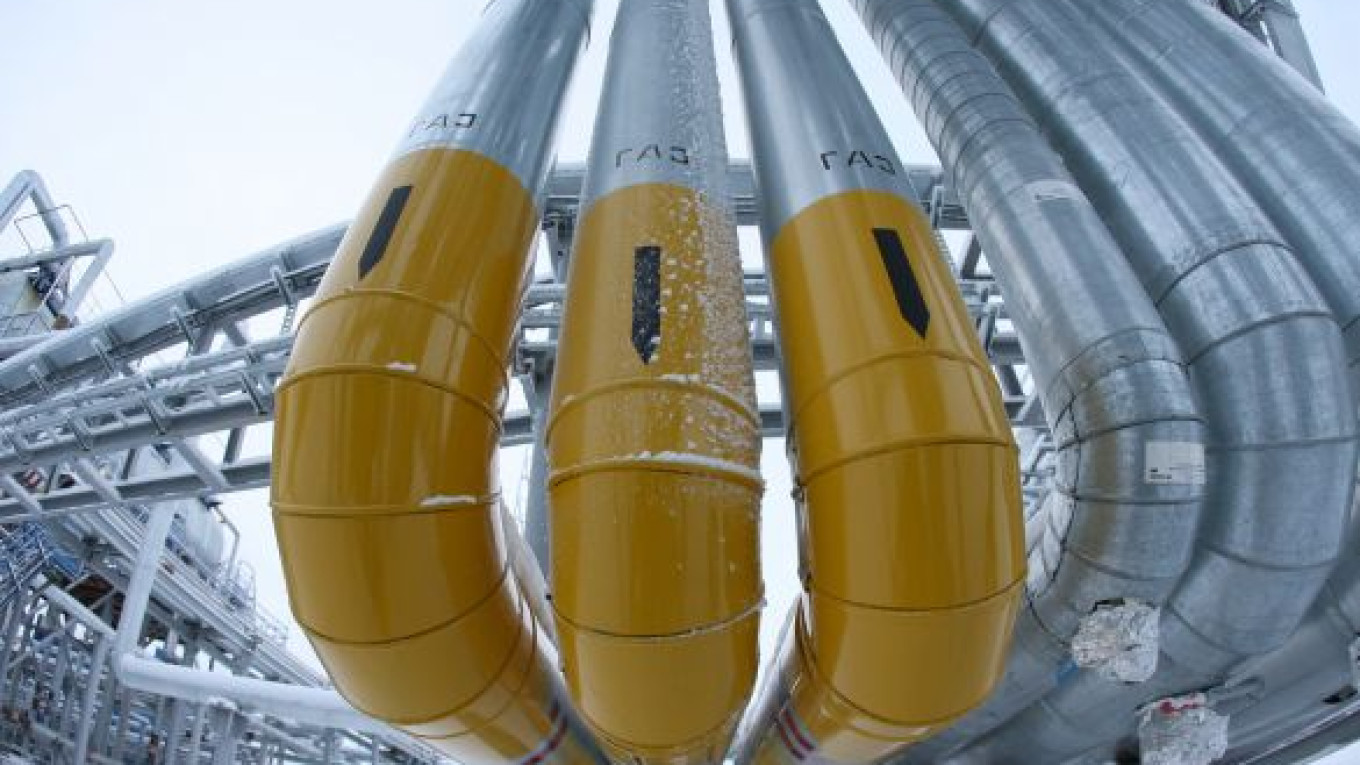In the run-up to a fresh round of gas price negotiations Ukraine promised Friday that there would be no resumption of an energy war with Russia, despite an escalating public spat between Gazprom and Kiev's Naftogaz.
Repeated failure to reach an agreement on a new price formula for gas contracts has prompted fears of a new standoff. The Kremlin shut off gas supplies in the dead of winter three years ago, hitting Central European consumers. Ukraine claims it has been forced to pay $12 billion to $15 billion in excess charges as spot prices have fallen since the 2009 deal with Moscow.
Ukrainian Prime Minister Mykola Azarov said Friday that questions about a new gas conflict were absurd. "I don't even intend to talk about this during my lifetime," he said, Interfax reported. "Why should we go to war with our Russian brothers?"
Azarov's words echoed comments made by President Dmitry Medvedev last week when he urged that any contractual issues between the two sides should be settled in a "civilized" fashion.
But tensions have risen ahead of long-planned negotiations between Ukrainian Energy Minister Yury Boiko and Gazprom head Alexei Miller that took place Sunday. No announcement about the results of the meeting had been made by either side early Sunday evening.
Boiko ruled out Friday that Ukraine would ever cede control of its pipeline network. Gazprom favors the move because it would give the monopoly greater control over exports to Europe. Such a trade-off in exchange for lower gas prices has been frequently mooted.
Naftogaz provoked Gazprom's ire Thursday when it announced an intention to slash the Russian gas it buys in 2012 from an expected 52 billion cubic meters to 27 bcm. Gazprom responded in a written statement that even hypothetically this was impossible. "Unfortunately we must remind our Ukrainian friends that the conditions for the market supply of gas are determined only by contracts," said Gazprom representative Sergei Kupriyanov.
In November, Ukrainian President Viktor Yanukovych said he hoped a deal solving the dispute could be signed before the New Year. No such deal was reached and Sunday's talks marked the official resumption of the negotiation process.
Kiev has also raised the specter of energy independence from Russia with senior politicians, stating that Gazprom's high prices make a switch to coal, liquefied natural gas and shale gas economically attractive. Yanukovych said Friday that the current gas price was "killing domestic manufacturers," Interfax reported.
Ukraine will increase its coal output 2.4 percent in 2012 and Naftogaz is looking to receive 12 licenses for shale gas exploration this year. In an indication of the potential impact of alternative forms of gas, prices for the fuel in the United States dipped below $100 per 1,000 cubic meters last week on the back of that country's shale gas revolution.
Though it has said $250 would be a fair price, under the contracts with Gazprom Ukraine is obliged to pay $416 per 1,000 cubic meters for gas in the first quarter of 2012.
But Troika Dialog oil and gas analyst Valery Nesterov told The Moscow Times that Kiev's threats to diversify had little short-term relevance.
"Ukraine is defending its position by rolling out all these horror stories for Russia. ... But, in reality, its dependence on Russian gas will, without a doubt, remain."
While the stakes were high for Russia, Nesterov added, they were higher for Ukraine. On top of economic hardship, an ultimate consequence of bad blood could be Moscow looking to shrink its use of Ukraine's gas distribution system, turning $20 billion worth of pipeline into scrap metal.
Hinting at such an eventuality, Medvedev said last week that recent agreements with Turkey over Gazprom's South Stream pipeline, intended to provide an alternative route to Europe, should be "taken into account" during negotiations.
A Message from The Moscow Times:
Dear readers,
We are facing unprecedented challenges. Russia's Prosecutor General's Office has designated The Moscow Times as an "undesirable" organization, criminalizing our work and putting our staff at risk of prosecution. This follows our earlier unjust labeling as a "foreign agent."
These actions are direct attempts to silence independent journalism in Russia. The authorities claim our work "discredits the decisions of the Russian leadership." We see things differently: we strive to provide accurate, unbiased reporting on Russia.
We, the journalists of The Moscow Times, refuse to be silenced. But to continue our work, we need your help.
Your support, no matter how small, makes a world of difference. If you can, please support us monthly starting from just $2. It's quick to set up, and every contribution makes a significant impact.
By supporting The Moscow Times, you're defending open, independent journalism in the face of repression. Thank you for standing with us.
Remind me later.


